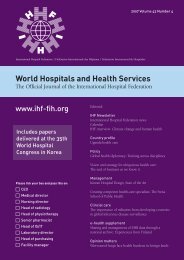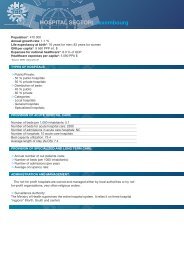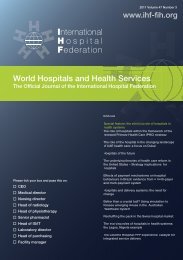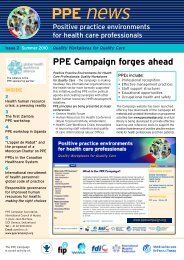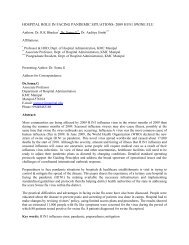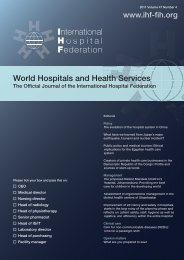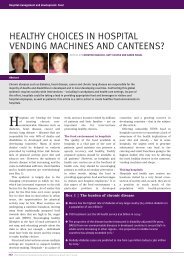World Hospitals and Health Services - International Hospital ...
World Hospitals and Health Services - International Hospital ...
World Hospitals and Health Services - International Hospital ...
Create successful ePaper yourself
Turn your PDF publications into a flip-book with our unique Google optimized e-Paper software.
IHF NEWSLETTER<br />
AMERICAS<br />
Peru becomes the fortieth country to ratify<br />
WHO tobacco convention<br />
PERU BECAME THE 40TH STATE to ratify The <strong>World</strong><br />
<strong>Health</strong> Organization Framework Convention on Tobacco<br />
Control (WHO FCTC) Treaty on 30 November 2004. In less<br />
than a year <strong>and</strong> a half, 40 countries from all regions of the<br />
world have taken the necessary steps to become contracting<br />
parties to the Treaty, making it the first international legally<br />
binding public health treaty under the auspices of WHO.<br />
The Treaty will enter into force <strong>and</strong> become part of<br />
international law in 90 days, following ratification by 40<br />
countries in the past 17 months <strong>and</strong> will improve health by<br />
contributing to the reduction of tobacco consumption,<br />
currently the cause of premature death for nearly five million<br />
people every year.<br />
For more information contact: The WHO/Tobacco Free<br />
Initiative on seoanem@who.int<br />
PAHO <strong>and</strong> USAID sign new regional<br />
partnership agreement worth US$20 million<br />
THE PAN AMERICAN HEALTH ORGANIZATION (PAHO)<br />
<strong>and</strong> the United States Agency for <strong>International</strong> Development<br />
(USAID) signed a new three-year US$20 million regional<br />
partnership agreement on the 15 November 2005 to<br />
improve maternal <strong>and</strong> child health, reduce infectious disease<br />
<strong>and</strong> strengthen health systems in the region.<br />
As part of the grant agreement, USAID will contribute<br />
US$4.168 million during the first year <strong>and</strong> US$12 million<br />
over the three-year period. PAHO’s contribution will be<br />
about US$8.1 million over the three-year period.<br />
In maternal <strong>and</strong> child health PAHO <strong>and</strong> USAID will work<br />
at the policy level to devote additional attention <strong>and</strong><br />
resources to reduce maternal mortality. In the area of<br />
infectious disease, the partnership will focus on stemming<br />
the tide of increasing resistance to commonly used drugs;<br />
promoting rational pharmaceutical use, <strong>and</strong> building<br />
capacity to treat TB <strong>and</strong> malaria. To integrate <strong>and</strong> strengthen<br />
health systems, ie. will improve public health capacities,<br />
management <strong>and</strong> administration of health services, foster<br />
linkages <strong>and</strong> analyse health information systems.<br />
For more information see: www.paho.org<br />
Chronic kidney failure in the United States<br />
increases 104% over decade<br />
UNITED STATES CASES OF CHRONIC KIDNEY failure<br />
doubled from 1990–2001 to 1,424 per million, due to an<br />
increase in the prevalence of hypertension <strong>and</strong> diabetes, the<br />
aging of the population <strong>and</strong> a higher survival rate for those<br />
with the disease, the Centers for Disease Control <strong>and</strong><br />
Prevention reported in October 2004. To reverse the trend,<br />
CDC recommends screening people at high risk, <strong>and</strong><br />
treating <strong>and</strong> controlling risk factors such as hypertension<br />
<strong>and</strong> diabetes. About 19 million adults have chronic kidney<br />
disease, <strong>and</strong> an estimated 80,000 are diagnosed with kidney<br />
failure each year.<br />
For further information see: www.cdc.gov<br />
EUROPE<br />
WHO concerned about absence from work<br />
due to stress-related conditions<br />
STRESS-RELATED CONDITIONS ARE THE MAIN CAUSE<br />
of absence from work in several countries of the WHO<br />
European Region, costing society increasing amounts in<br />
sickness benefits <strong>and</strong> lost working days. Studies suggest<br />
that 50–60% of all working days lost in those countries are<br />
related to stress. Experts gathered in Tallinn, Estonia, on<br />
4–5 October 2004 to discuss mental health <strong>and</strong> working<br />
life, in preparation for the WHO European Ministerial<br />
Conference on Mental <strong>Health</strong> to be held in Helsinki in<br />
January 2005.<br />
According to a survey in 2000 by the European<br />
Foundation for the Improvement of Living <strong>and</strong> Working<br />
Conditions, 28% of the 160 million workers in the<br />
European Union complain of stress at work <strong>and</strong> over half<br />
the workers report working at very high speed, <strong>and</strong> to tight<br />
deadlines. Work-related stress factors contribute to a wide<br />
spectrum of ill health: 13% of the European Union<br />
workforce complain of headaches, 17% of muscular pains,<br />
<strong>and</strong> 30% of backache, in addition to many other, even<br />
potentially life-threatening diseases.<br />
The meeting of experts in Tallinn, hosted by the Estonian<br />
Ministry of Social Affairs, examined employment practices<br />
across Europe, how different companies tackle stress at the<br />
workplace <strong>and</strong> what measures can improve workers’ mental<br />
health. Its conclusions will form part of the Ministerial<br />
Conference in Helsinki in January 2005.<br />
For more information: press_office@euro.who.int<br />
New <strong>World</strong> Medical Association Secretary<br />
General appointed<br />
DR OTMAR KLOIBER, deputy Secretary General of the<br />
German Medical Association, has been unanimously<br />
appointed as the new Secretary General of the <strong>World</strong><br />
Medical Association. He succeeds Dr Delon Human, a<br />
former family physician from Pretoria, South Africa, who is<br />
st<strong>and</strong>ing down as Secretary General in early 2005 after<br />
seven years in the position.<br />
Dr Kloiber, who is 47 <strong>and</strong> a pathophysiologist, has been<br />
working at the German Medical Association since 1991.<br />
Before then he was involved in research on neurotoxicology,<br />
first at the University of Minnesota in the United States <strong>and</strong><br />
then on pathophysiological studies at the Max-Planck<br />
Institute for Neurological Research in Cologne, Germany.<br />
For more information see: www.wma.net<br />
The Editor would like to thank the <strong>World</strong> <strong>Health</strong><br />
Organization, the <strong>World</strong> Medical Association, the<br />
Amercian <strong>Hospital</strong> Association, the Pan American<br />
<strong>Health</strong> Organisation <strong>and</strong> the Global Forum for<br />
<strong>Health</strong> Research for their help in compiling the<br />
<strong>International</strong> news. Should you have any suitable<br />
news items, please email your information to<br />
Sheila@ihf-fih.org.<br />
Vol. 40 No. 4 | <strong>World</strong> <strong><strong>Hospital</strong>s</strong> <strong>and</strong> <strong>Health</strong> <strong>Services</strong> | 09



